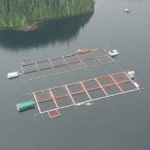
Farmed Salmon Pen
by Catherine Haug, Jan 12, 2015 (image, right, from farmedanddangerous.org (1), originally by L. Renehan/Living Oceans Society)
According to Farmed And Dangerous (1), there are many negative impacts from the salmon farming industry, including environmental, human health, economic and food fishery impacts (see below for details.). One they don’t list (because the full impact is not yet known) is the newly approved GMO/GE farmed Atlantic salmon. These GE salmon are genetically manipulated to grow faster than native Atlantic salmon by adding genes from an eel to that of the salmon (these two species would not mate naturally). See my earlier post GE Salmon given green light by the FDA for more.
Even if you eat only wild-caught salmon from native fisheries, you are not free of the risks of farmed salmon, because farmed salmon can and do escape their pens into the environment. They can pass on disease and other problems to wild salmon.
Negative impacts of salmon farming
The following are from farmedanddangerous.org (1); see that site for more details. In the remainder of this post, I focus on just one of these impacts: a viral disease common to farmed known as ISA (infectious salmon anemia virus), which has been recently detected in wild salmon.
The Environmental Impacts of Salmon Farming
- Sea Lice
- Chemical Treatments: SLICE
- Disease
- Algae Blooms
- Marine Mammal Deaths
- Marine Debris
- Waste on the Ocean Floor
- Escapes & Alien Species
- Fish Feed
The Human Health Impacts of Salmon Farming
- PCBs & Contaminants
- Excessive Antibiotic Use & Resistance
- Healthy Fats From Healthy Oceans
- Chemical Dependence
- Organic Farmed Salmon?
The Economic Impacts of Salmon Farming
- Value of Wild Fish Marine Industries
- The Jobs Myth
- Skeena Salmon: Risking a $110 Million Dollar Industry
The Impacts on BC First Nations Communities from Salmon Farming
- Contamination Threats to Food Fishery
ISA (infectious salmon anemia virus)
The following is paraphrased and summarized from the article in Take Part (2).
This pathogenic virus has been around for quite some time, and is justifiably feared. It primarily affects farmed salmon, but has recently been detected in wild salmon from he British Columbia (BC) fishery, according to a new study published in Virology Journal. Once it was detected in this wild fishery, it set off alarm bells, as it can easily spread to other wild salmon fisheries, with devastating outbreaks from Alaska down to the Pacific Northwest.
The virus is a member of the influenza family, and mutates easily. The BC Salmon Farmers Association is minimizing the importance and potential negative impact of this virus, by attacking the methodology of the study, as stated by their executive director: “We have great concerns about the methodology and the ethics of the researchers involved, given their history of reporting false positives with respect to ISA. None of the results reported in this paper have been confirmed by an outside laboratory.”
The study authors refute this criticism, citing the difficulty in detecting the virus until the damage is done, and the fact that the virus they found in both wild and farmed salmon in the BC fishery is a mutant variant and does not match that found elsewhere. Furthermore, the BC farmers refused access to their fish for sampling.
This resistance to the study results is linked to the bottom line of the BC farmed salmon industry. If the finding is confirmed, Canada would be obliged to report it to the International Organization for Animal Health in Paris. That notification would permit other countries – including the US – to block imports without fear of incurring trade penalties. This would be a devastating financial blow to the BC industry; consequently they will continue to deny support of the study.
Buyer beware!
References:
- Farmed and Dangerous image: farmedanddangerous.org/salmon-farming-problems
- Take Part: takepart.com/article/2016/01/11/researchers-virus-infecting-farmed-and-wild-salmon-british-columbia?cmpid=tpdaily-eml-2016-01-11 article by Richard Conniff
- Virology Journal: virologyj.biomedcentral.com/articles/10.1186/s12985-015-0459-1